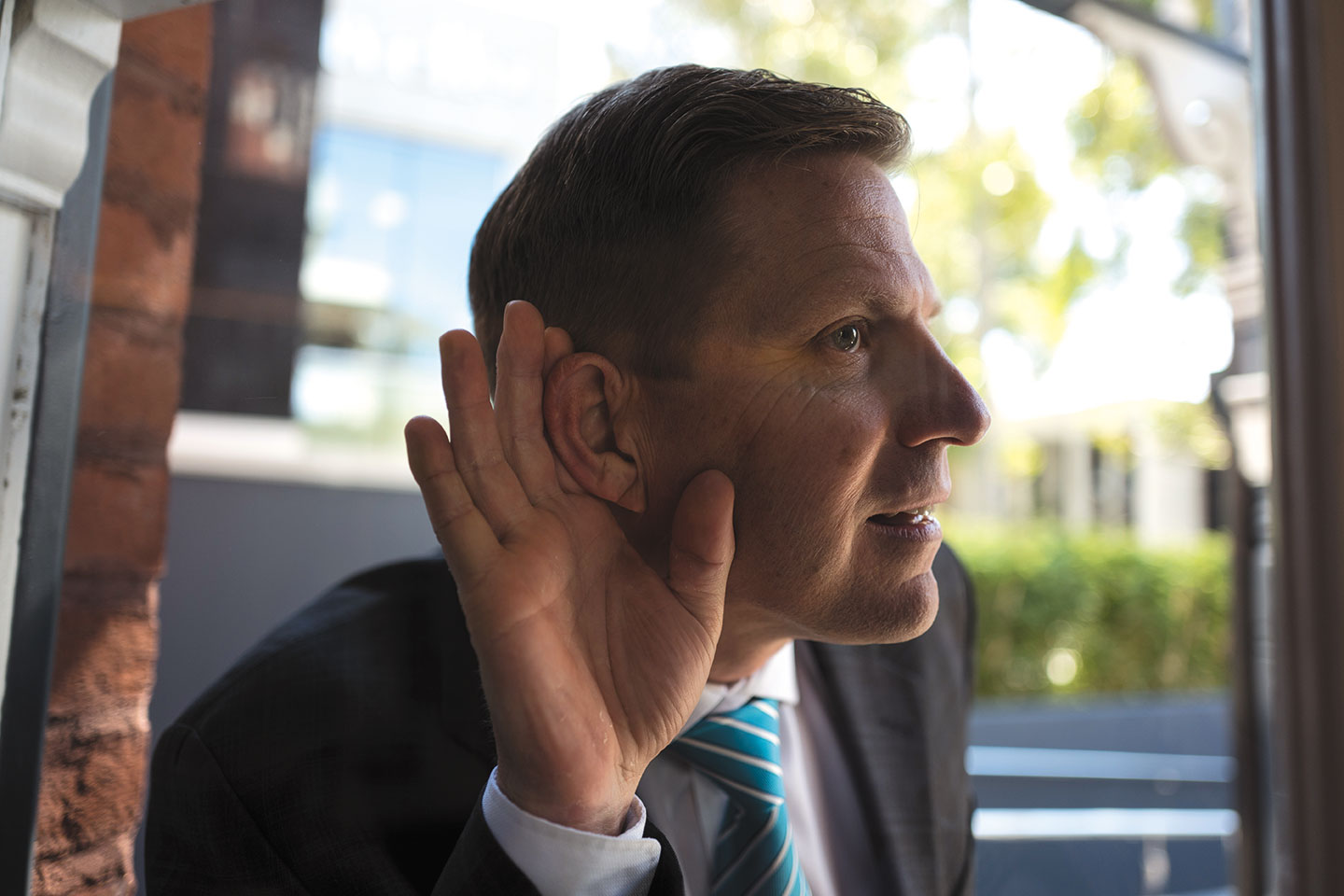Tertiary education may not have sat comfortably with Justin Miller, but his connections to Curtin University have played an important role in the development of his Sensear and Nuheara businesses.


Justin Miller’s decision to launch his wearable technology firm from an outpost such as Perth might never have happened if his father had not returned to his Western Australian roots after retiring from the air force.
Although Canberra-born Mr Miller only spent his last years of high school at Guildford Grammar, he nevertheless calls WA home.
The entrepreneur, founder and chief executive of listed wireless earphone business Nuheara, whose companies have twice won the Business News Rising Stars award, admits he is no poster child for university education.
He twice started tertiary courses without managing to finish. His second attempt, studying computer science at Curtin University, has something of a fairy-tale ending, however – he has built two businesses on the back of technology developed by researchers at that institution.
Mr Miller’s interest in computer science, at a time when the technology and its applications were developing faster than academia could keep up, led him not only to do student work in the field but, inevitably, to drop out and start a career.
“When I was at uni, I was working on the production lines, I was doing packing, I was doing filling, I was doing cleaning,” Mr Miller said.
“I got into some manufacturing and that’s when they discovered I was studying computers at university, and they said, ‘Hey, can you come and do some work for us and work out how we move into PCs and those sorts of things?’
“Life’s about being in the right place at the right time, right? And that was one of them.”
This was at a pharmaceutical company called Delta West, where he ended working full-time.
“So the whole personal computing thing was starting to take off. To that point it had been mainframes and those sorts of things,” Mr Miller told Business News.
“It was a really exciting time to be in that whole technology space and I started working for a company and found I was learning more within the company than I was at university, and it was just one of those timing things.
“It was evolving so quickly and particularly at that time.
“Technology is an interesting thing where it has these swings and roundabouts where it can go very, very quickly at times, and I think we’re in one of those moments today.”
Mr Miller started as a programmer but, after marrying at a relatively young age, ended up in sales working for Business Computers of Australia
“A salesman is what I am,” Mr Miller said.
“That is my profession and I think it’s a great profession; I’m very proud to call myself a salesman.
“If you’ve got a sales background, it does educate you for a lot in life, so I got into IT sales, products, services, and quickly progressed to being a state manager.”
By the end of the 1990s, as the dot.com wave was cresting, Mr Miller, at almost 30 years of age, decided he had enough experience to follow a yearning to go out on his own, starting an IT services business called Tusk Technologies.
“I think it’s the same as anyone looking at stepping off, because it is a big step when you go from working for someone else to stepping off to do your own thing – you’ve got to serve your apprenticeship,” Mr Miller said.
Two years later, after strong market success that included the IT boom known as Y2K, he believed diversification was necessary, and joined forces with human resources software company BigRedSky, which had also been founded in 1999.
The combined entity was renamed Empired and continued to run two distinct businesses.
Mr Miller said it was a successful partnership but ultimately the desire of some parties to list the business on the ASX led to his departure in 2005.
“I was actually against the listing process and (that’s) part of the reason I’m not there,” he said.
“I just felt it was too early in its life cycle to be tempting that, which is slightly ironic where we find ourselves today with Nuheara.
“But at that point in time with limited annuity services-type business, I thought it was not the right thing to do anyway, but ultimately that led to a separation of sorts.”
Mr Miller said exiting Empired set him up to comfortably pursue new business ideas, and he started looking at opportunities from another technology point of view.
One organisation he started working with was the Western Australian Telecommunications Research Institute, a now-defunct joint initiative between Curtin University and the University of Western Australia. WATRI had early but proven technology that separated speech from industrial-type noise.
Mr Miller developed a business plan to commercialise the technology in a business called Sensear.
“Interestingly enough, when we set up Sensear as a business, we weren’t actually trying to build a product, we were looking to license that technology,” he said.
“We actually went to the major players in that particular space and around the world and you know, the 3Ms and these big industrial-type companies.
“At the end of that first year, we’d set ourselves up to license this technology, and it was very smart technology.
“It became very clear through that process we were still going to end up doing all the work and the companies that were licensing were going to make all the money.
“So we flipped it, we pivoted and I think that’s important with any business; you’ve got to have this ability to have the mindset to say, ‘Well, we’re not firming our tracks there. There will be a need along the way to provide that pivot’, and that was the pivot for Sensear.
“We decided to say, ‘Okay, well now we have to become a manufacturing company’, so we set about manufacturing headsets for high-level noise.”
Perth investor Charlie Morgan largely funded the move, via his investment vehicle Seaspin.
While Sensear remains based in Belmont, in part to protect the business’s intellectual property, Mr Miller said the business-to-business market required the sales staff to be close to their customers.
Mr Miller led the sales push in Sensear’s early days, particularly to the big industrial sites of North America.
He moved his young family to San Francisco and spent his work time either visiting big factories and facilities or immersed in the burgeoning technology world of California, including nearby Silicon Valley.
After four years in the US, Mr Miller felt he needed to return to Perth otherwise his family would establish deeper roots in the US and might never be able to transition back.
He went looking for a new spin on his audio technology, realising that wearables was the next thing.
As it happened, Curtin was again the place where such expertise resided and he ended up forming a new venture called Nuheara with his US-based partner from Sensear, David Cannington, to commercialise wireless ear buds that can play audio via Bluetooth and assist the listener by reducing background noise.
While Nuheara has some similarities to Sensear, it is a very different beast in many ways.
Importantly, the technology is aimed at consumers, not commercial users, and the technology, among other things, aims to reduce more normal background sound. Sensear’s headsets, on the other hand, focus on separating two vastly different parts of the audio spectrum – voice and industrial noise.
Nuheara has raised funds via crowdfunding, listed on the ASX and centralised its manufacturing in China, compared with the private Sensear business, which assembles components in Perth.
Mr Miller said the decision to outsource manufacturing was a function of timing and the advantages gained by using an established high-tech manufacturer to meet demand from the global consumer market.
“In a B2C environment that becomes a little simpler than a B2B environment, and I mean that we can reach a lot of the world through different means now, on the consumer front, in terms of advertising, and those sorts of things,” he said.
“But in terms of delivery, what we’ve learned over the years is to keep your core close and then find people, find organisations externally, that you can afford to outsource to.”
Aside from manufacturing, Nuheara has outsourced logistics and warehousing, but has retained control of marketing through its US operations.
“Customer service we still retain in-house,” Mr Miller said.
“The ability to touch the customer is something that other companies have outsourced, (but) it’s just something at an early stage that we’re not prepared to do.”
As with Sensear, Perth remains the corporate hub and technology centre for Nuheara.
“So (outsourcing logistics and manufacturing) gives us the means to control what we do in Perth, very closely,” Mr Miller said.
“And those things that we control very closely are our R&D and our engineering.”
He said being ASX listed was challenging but that route had been chosen as it meant the business could remain based in Perth and still raise the considerable funds needed to get Nuheara’s IQbuds to market quickly, in order to get the jump on potential competition in the fast-moving consumer electronics sector.
However, Mr Miller said that plan nearly came unstuck when the regulator’s push-back on reverse takeovers meant that Nuheara had to return its first round of funding to investors and seek mezzanine investment in order to make a physical prototype, rather than rely on the desktop modelling in its original prospectus.
Mr Miller said the firm had Chinese investors who wanted to fund the business, so it was all the more disappointing to have had regulatory hitches in the listing process when the objective was to keep the technology in Australian hands.
He believes regulators here need to better understand the technology development process if they want more companies to list their technology in Australia.
Ironically, Nuheara has yet to actively market its product in Australia because local retailers have a cost structure that makes it hard for Mr Miller’s business to attain the same margins as elsewhere.
But Australia’s lifestyle, and particularly that of Perth, does have some advantages when it comes to attracting and retaining the right people in terms of technology skills.
“We’ve brought people in from around the world who are now living in Perth,” Mr Miller said.
“Because it’s a great place to live, you know? And it supports our case for coming back here, as well.
“It’s good, and once they’re out here it’s not ultra-competitive, right? We still have to look after our employees, but we’re not worried about Google knocking us off because we’re 100, well, eight hours in any direction, you know we’re still going nowhere so there are some barriers.”
Mr Miller said the lifestyle advantages and distance from technology centres such as Silicon Valley also kept the cost down because there was not the constant bidding war for talent. That was especially the case as other raised big money to challenge Nuheara’s position.
“So we’ve got competitors in the market that have raised $US50 million to $US60 million, and haven't got as far as we have on sub-$20 million,” he said.
“So, I think experience shows we know how to do it.
“We know how to do it cost effectively and, I think, well, I don’t think, I know that being based here is actually a good thing for our business.”











